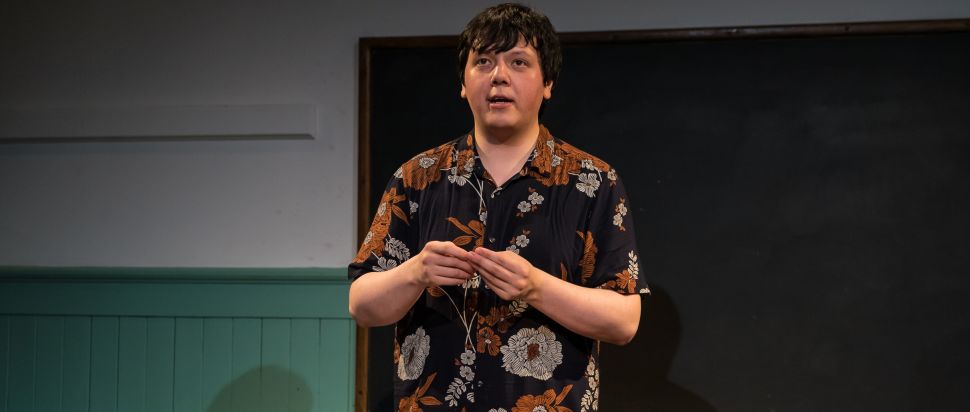Word Soup: Sean Wai-Keung on Dumpling Poetry
We chat with food-poet Sean Wai-Keung about his Push The Boat Out event Dumpling Poetry, and the community spirit inherent to both cooking and performance
Sean Wai-Keung recalls the first time he began making dumplings. A teenager, he buys a pack of 100 dumpling skins, testing out different flavours and spices. And then he runs out. The nearest supermarket that sells them is too far away, so he looks up a recipe and, realising it’s just flour and water, decides to make them himself. “That’s the way that I get into a lot of food – from scratch,” Wai-Keung explains. “I think by making something from scratch, you gain an appreciation for how things used to be done, where the ideas for how this food comes together might have come from originally.”
We have met, conveniently, in Glasgow’s Dumpling Monkey. We order vegetable and special mix dumplings, flat noodles and salted fish and aubergine as Wai-Keung tells me about his journey as a poet and his upcoming event at Edinburgh's international poetry festival Push The Boat Out – the appropriately named Dumpling Poetry. Part cooking-class, part poetry-reading, Wai-Keung will read from his debut collection Sikfan Glaschu, published in 2021, and come together with an audience to mix flour and water, fold in rich and nutritious fillings, boil to cook, and finally: eat.
An interdisciplinary writer and performance-maker, Wai-Keung’s creative practice blends community, art and performance through food and poetry. “I think of food as just being a natural extension of why I enjoy poetry,” he explains. While poetry helped him come out of his shell as a child, he quickly found himself wanting to expand his practice, to connect with people more directly than allowed in traditional performance settings. Sharing food, he found, was the perfect way to do this, and it quickly became an avenue through which he could experiment and explore, allowing him to harness the connective ability and community abundancy of poetry.
His dumpling-making workshop builds on similar events over the past few years that sought to connect people with food, sharing and community, as well as with the materiality that produces all that nourishes us. Over lockdown, alongside a poetry reading, he showed people via Zoom how to make hand-pulled noodles in their own kitchens; last year at Push The Boat Out, he used fortune cookies to create collaborative poems with an audience while sharing warm broth.
The collection he will read from at this year’s event is anchored around a similar ethos. A snapshot of Glasgow in the five years up to the 2021 lockdown, the contents of Sikfan Glaschu alone conjures up a map – and for those familiar to the city, memories – of Glasgow’s most loved eateries, from Ranjit’s Kitchen to Paesano’s and, of course, Dumpling Monkey. The collection illuminates migration histories, the minimum wage service industry, and socioeconomic precarity before and during the pandemic. In his work, Wai-Keung seeks to demystify food in all its ways, from how it is made to its relationship with labour and capitalism. “Part of what I wanted to do was… hopefully encourage people to connect themselves back to what the food actually is, how the food developed, [and] what the ancestors who made that food from scratch might have been doing before the days of mass production and industrialisation.”
We close the interview chatting about the concept of dumplings, and our favourite way to eat them. “I’ve become a huge fan of kimchi in dumplings”, he enthuses, “like actually the inside of dumplings.” We debate boiling versus frying, and both of us settle on boiling as our favourite way to cook them, and he ponders his preference for thicker skins – it makes them chewier, which he likes. I lament my lack of skill in dumpling folding, growing up watching my mum fold meticulous, picture-perfect gyoza. We look together at the folded dumplings in front of us as Sean admits he’s not very good at it either. “The first dumpling I do, it's perfect. It's incredible. It's magical. And the next one is a bit less good. And then the tenth one comes along, and I'm literally just doing the bare minimum to close it.” But that’s the thing, he says – there’s no correct way. “If you're just eating with friends or with family, it doesn't matter if they're perfect or not. As long as they hold together and they're in the soup – that's how they were done originally. It was just a way to hold things in a skin.”
Sean Wai-Keung’s Dumpling Recipes:
Chive in dumplings: “Try pork and chive, or chive, beansprout, carrots, and cabbage.”
Frying dumplings: “If you're frying dumplings, add something a bit crunchy in there, like a king prawn. Och, amazing, amazing.”
Boiling dumplings: “My favourite way of eating dumplings is always boiled and often in soup.”
Vegetables in dumplings: “Something more vegetable-y, with a bit of pepperiness to it is always very, very nice.”
Kimchi in dumplings: It explains itself.
Dumpling Poetry, Summerhall, Edinburgh, 25 Nov, 12.30pm; Push The Boat Out takes place 24-26 Nov at Summerhall
